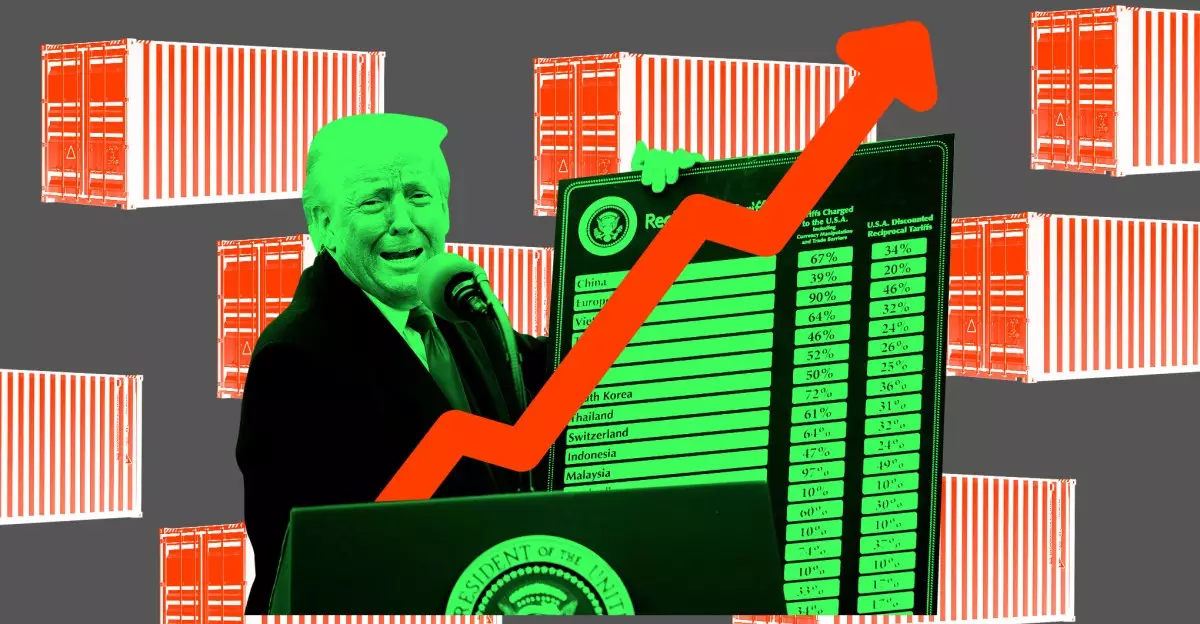The tech industry, once heralded as an unassailable titan in a rapidly changing world, now finds itself caught in a complex web of geopolitical tensions. A prime example of this turbulence is the growing estrangement between the US and its European allies, particularly as additional tariffs loom over major tech players like Meta, Apple, and Tesla. The situation intensifies with European Commission President Ursula von der Leyen suggesting a levy on the advertising revenues of American digital services, a move that would act as a financial countermeasure in a global trade spat. This evolving scenario starkly contrasts the initial optimism from tech leaders who believed that political support from figures like former President Donald Trump would bring stability.
For many in the tech sector, Trump’s administration presented an opportunity—a chance to leverage influence and secure favorable conditions against European regulatory frameworks. Companies such as Meta, led by Mark Zuckerberg, expected to find a champion in Trump, someone who would advocate for more business-friendly relations. However, instead of an ally, Big Tech has been caught in the crossfire of an escalating trade war that could yield crippling consequences.
The Immediate Repercussions for Tech Stocks
Elon Musk’s Tesla offers a compelling case study in how differentiated messaging can profoundly influence stock markets and consumer confidence. Tesla’s stock is currently reeling, having lost a staggering portion of its value this year, exacerbated by the political climate and tariffs stifling its operations in key markets like China. Uncertainty breeds hesitance, and investors are now wary as Tesla has been forced to retract options that once made it appealing for consumers wanting US-made vehicles. The stakes are not merely financial but existential; the very identity of Tesla as a pioneer is in jeopardy as the company maneuvers through these turbulent waters.
The ongoing saga with TikTok further illustrates this precarious relationship between politics and technology. Despite continuing to capture user engagement, TikTok’s future in the US appears increasingly uncertain. China’s staunch defense of its enterprises complicates negotiations, with government responses indicating that they view US tariffs as an infringement on equitable trade practices. This not only places TikTok’s operational posture in jeopardy but sends ripples across the broader tech landscape, revealing how fragile dominance in the digital arena can be under international disputes.
The Complex Dynamics of OpenAI and the AI Landscape
As if this were not enough, the sphere of artificial intelligence is experiencing significant stress as well. OpenAI, originally founded as a nonprofit entity, finds itself under scrutiny not just from legal perspectives but also from ethical dimensions. Critics, including former employees, are raising concerns over whether the organization has strayed from its philanthropic roots. The shift towards a more commercially focused model raises pressing questions: Has the pursuit of financial success overshadowed ethical responsibility? The complexity of this debate highlights the larger discourse surrounding tech companies and their roles in society—are they mere instruments for profit, or do they bear broader ethical responsibilities?
The tech industry appears to be at a crossroads, grappling with ethical dilemmas, financial repercussions, and geopolitical tensions simultaneously. With companies like Google undergoing layoffs and restructuring, indicative of a sector recalibrating its priorities, employees also face increasing uncertainty in their roles. This shift underscores a broader concern within the workforce regarding security and stability in an ever-evolving industry landscape.
The Larger Narrative of Trust and Consumer Confidence
What becomes evident amid this backdrop is the rising skepticism towards Big Tech. Public opinion is shifting, driven by perceptions of not only monopolistic behaviors but also the very legitimacy of these companies’ operations within a global context. The sheer scale and influence of tech companies have transformed them into bargaining chips in international diplomacy. While they have thrived under conditions of relative harmony, today’s hostile environment risks painting them as pawns rather than the powerful entities they once seemed to be.
Consequently, the tech sector must re-evaluate its relationship with both consumers and policymakers. As trusting consumers become increasingly wary, they demand accountability from the very platforms they once blindly embraced. Companies now find themselves in the unenviable position of having to navigate not just market competition but also geopolitics and public sentiment with renewed vigilance.
As these challenges continue to unfold, a critical lens reveals the fragility of the tech giants. No longer can they assume invincibility amidst global challenges; instead, adaptability and ethical responsibility must take center stage in this volatile arena. The tech landscape is undeniably morphing, and those who can strategize and innovate in response to these multifaceted issues will emerge as the true resilient leaders of tomorrow.

